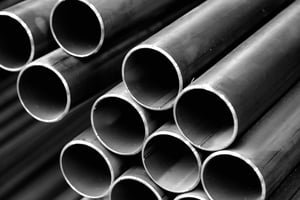 The pharmaceutical industry must have strident demands of ultra-purity and corrosion-resistance. Due to the harsh environment of chemicals and parts cleaning processes, equipment employed for pharmaceutical applications must withstand repeated caustic chemicals and high temperatures.
The pharmaceutical industry must have strident demands of ultra-purity and corrosion-resistance. Due to the harsh environment of chemicals and parts cleaning processes, equipment employed for pharmaceutical applications must withstand repeated caustic chemicals and high temperatures.
Sanitary tubing are essential components of many pharmaceutical processes, but the material of which they are made influences how well they uphold purity and optimize performance.
What Are Sanitary Pipes?
Sanitary pipe fittings and tubing are widely used in the pharmaceutical industry for processes ranging from chemical extraction to material processing. They must be designed with materials that will resist chemical corrosion, since pharmaceutical processing environments can be particularly harsh. Sanitary pipe fittings need to be pocket-free for no risk of bacteria entrapment, while tubing must be easy to sanitize frequently for optimal sanitization.
There are multiple types of sanitary pipes in the market, though not all materials are equal in quality.
What Are Sanitary Pipes Used For in the Pharmaceutical Industry?
The pharmaceutical industry is under pressure to ensure the safety of their products and produce them as efficiently as possible. As a result, industry standards are high for applications employed by the pharmaceutical and biotech industries.
Tubing is used for a variety of pharmaceutical applications, such as fluid transfer, filling operations, and peristaltic pumping.
Sanitary pipes for the pharmaceutical industry must meet certain requirements to perform as effectively as they should. This includes the ability to uphold strident standards of cleanliness and repeated wear and tear. Some tubing is easier to sterilize and keep pure than others. Absorption and permeability must also be considered when looking into different types of sanitary pipes. Some materials absorb the products they are working in, which can lead to issues. Any surface pockets can also harbor bacteria and other contaminants, which compromises the sterility of the sanitary tubing.
Types of Sanitary Pipes
The most common types of sanitary pipes include:
Steel
Steel is an ideal and useful material for sanitary pipes. Not only is it durable in high temperatures and naturally corrosive resistant, but it can be electropolished to achieve a smooth surface for enhanced sterilization.
Plastic
Plastic options are a cheap solution for pharmaceutical applications, but can only withstand certain temperature conditions before losing their structural integrity.
Silicon
Silicone tubing is a popular option for sanitary piping. Polymeric materials create flexible tubing, which is low cost and easy to use. However, silicon tubing is at risk of particulate contamination which can be a concern for sterility.
Aluminum
Aluminum alloy piping offers corrosion resistance and strength. They are rigid and likely not to bend. Aluminum tubing is generally employed with salt solutions since they can withstand chloride corrosion.
Why Medical Grade Stainless Steel is The Best Option for Pharmaceutical Uses
Sanitary tubing used for pharmaceutical industry applications must be resilient enough to preserve their structural integrity despite harsh chemicals, frequent use, and high temperatures.
Stainless steel is an ideal material for sanitary tubing due to its natural properties, which make it durable for the harsh environments of pharmaceutical applications. Due to its highly corrosion-resistant nature, stainless steel tubing can be repeatedly subjected to corrosive chemicals and solvents, whether salt, blood, and sanitizing agents, without damage.
When compared to alternatives, such as plastic, stainless steel can withstand higher temperatures while retaining its shape. In fact, even the softest of stainless steel alloys tend to be many times stronger than even the strongest plastics.
Maintaining a sterile environment is a high priority for any pharmaceutical equipment. The combination of stainless steel’s naturally sterile nature and electropolishing allow this material to ensure a higher degree of sterility compared to alternatives. Electropolishing, or electrochemical polishing, reduces the surface roughness by leveling out microscopic peaks and valleys, which in turn improves the surface finish. The end result is a microscopically smooth surface for thorough sanitation. Stainless steel tube fittings ensure there are no pockets where contaminants can lock onto with potentially harmful consequences. Besides leaving no abrasions for chemicals or bacteria to latch on, steel is a non-absorbent material so, unlike other materials, there is no risk of spreading or absorbing contaminants.
Additionally, stainless steel materials have greater sustainability than other options. Steel is easy to reuse and recycle compared to the majority of polymers. Where plastic may end up in the dump or the ocean as pollution, steel can be re-smelted and used in countless other products with ease.
These are just a few of the benefits of stainless steel tubing for pharmaceutical applications. Marlin Steel has the materials, tools, and expertise to manufacture the best stainless steel wire forms for your needs. For more information about using metal forms in your pharmaceutical applications, reach out to the Marlin Steel team today.



.gif)


